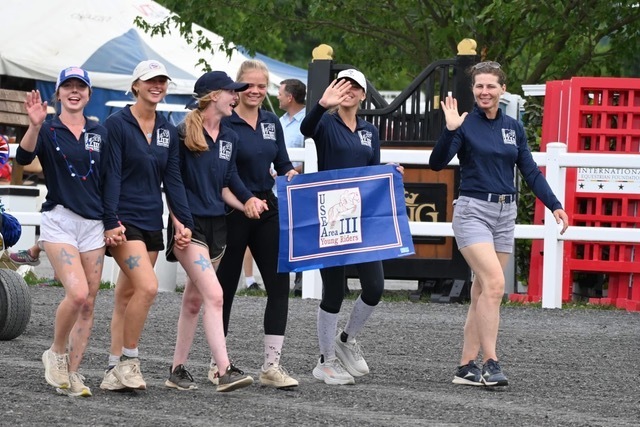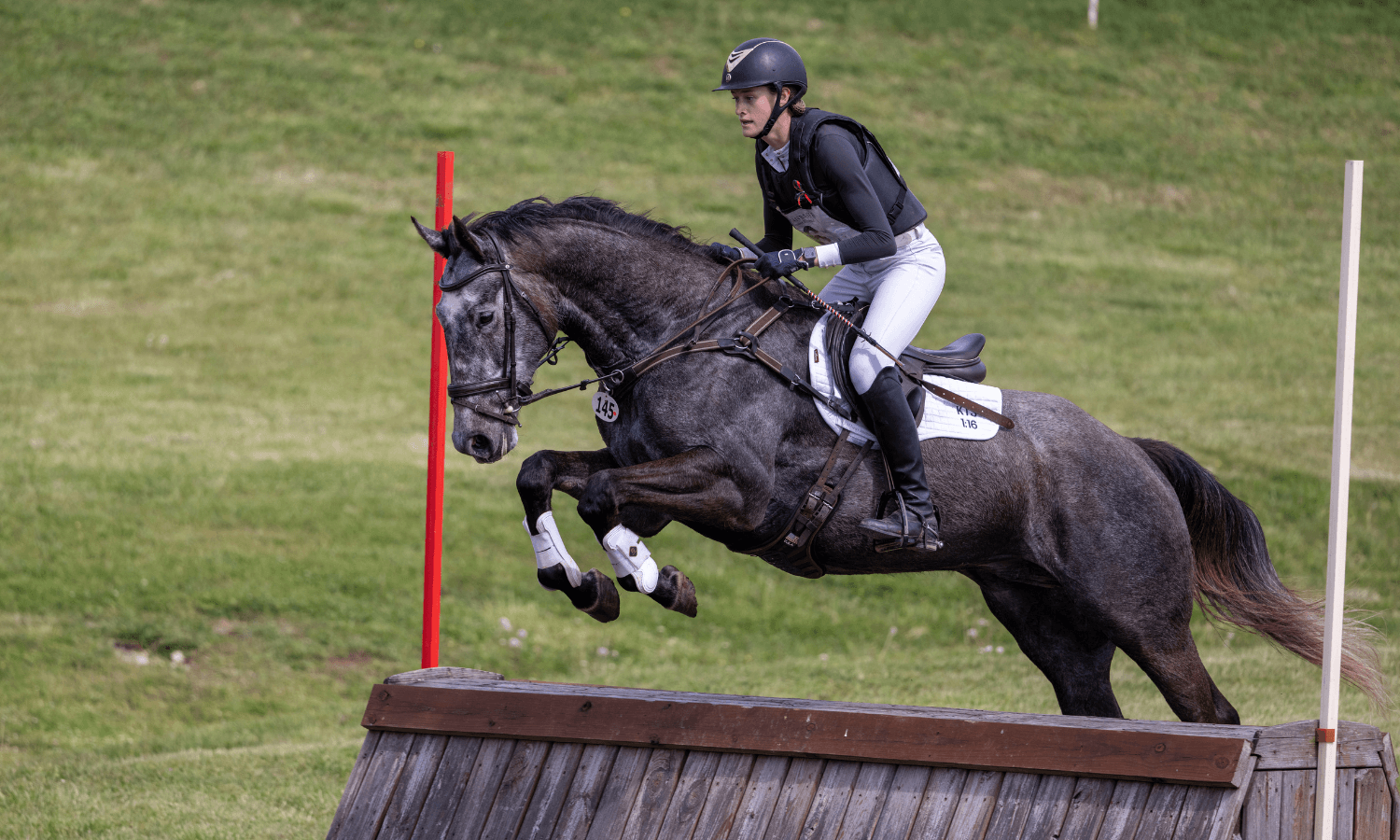ECP Coach Ashley Johnson: Better Coaching for a Brighter Future

What makes a trainer qualified to coach? Could it be a master’s degree in psychology from Harvard University? A career as a five-star event rider? Being an ‘A’ rated Pony Club graduate? Getting your license as a U.S. Equestrian Federation ‘R’ judge and technical delegate for eventing?
Ashley Johnson has all of these qualifications but feels she can always further her education as a coach. Thanks to a lifelong love of learning, she became qualified as a Level V certified coach through the U.S. Eventing Association’s Eventing Coaches Program (ECP) in 2009 (formerly the Instructors' Certification Program) and still seeks out professional development opportunities.
On top of coaching, Johnson has also had a successful competition career. In 2016, she rode off-the-track Thoroughbred Tactical Maneuver (Thunder Gulch x Chelle Spendabuck) in their first five-star at the Rolex Kentucky Three Day Event, where they pulled off a clear cross-country round. “I competed at the Advanced level for about two decades, pretty consistently,” Johnson said. “I think I've had seven different horses at Advanced and one horse at the five-star level. And the five star horse, he spent nine years at the Advanced level.”
However, Johnson, 49, started coaching well before her five-star career. At just 15 years old, she was introduced to the basics of coaching through Pony Club. “Part of the Pony Club system is that if you're going for your ‘A,’ you have to pass a coaching or teaching section,” Johnson said. “So, I started learning how to teach through that system, probably when I was 14 or 15, and I started teaching littler kids. I would say I started really, actually teaching when I was about 16. Then that's what I did to earn money through college.”
Since then, she was named coach of the University of Florida Eventing team and, in 2022, was named Area III Young Rider coach. Currently, she’s working as an apprentice coach with the USEA Emerging Athletes Under 21 (EA21) program and will take on more involvement as a coach in 2026.
The foundation of her teaching philosophy is simple: correct basics lead to correct riding. Correct riders are in harmony with their horse. “I place a very strong emphasis on harmony with the horse, and I really believe that having correct position and having correct balance and aids and an understanding of those aids is going to create more harmony,” she said.

While her coaching philosophy hasn’t changed over the years, she says that breeding and training young horses has had a big influence on how she develops her students. “Taking a simple but steady approach makes such a big difference in the confidence of the horses, and so that has really solidified my philosophy that it's better to go slow and steady,” Johnson said. “It's better to explain everything and make sure that there's a consistent understanding for the horse and the rider.”
Like the turtle and the hare, Johnson is a firm believer that the more time is taken to create a solid foundation, the more it will pay off in the future. “Don't be afraid to take more time,” Johnson said. “Don't be afraid to really hone the basics. It's better to have harmony and understanding than to just do something for the sake of doing it.”
Johnson applies this philosophy to herself, as well as her students. While many trainers would believe that teaching for decades would make them more than qualified to do so, Johnson knew that she could benefit from more training.
“I felt like I could use more information,” Johnson said. “There were some really top coaches at that time. I had worked with Jimmy Wofford, I had worked with David and Karen O'Connor, and I knew that, even though I was competing in Advanced at that time, I knew that there were some really top coaches that knew how to explain things better than me. They just had the foundational work and the words to explain a concept in a really good way. I felt like becoming ECP certified would help me gain that vocabulary.”
According to Johnson, achieving her ECP certification helped her teach advanced skills to her students while paying even closer attention to the details that can mean the difference between a lightbulb moment and a confused pupil.

“As I got further into the program, I was learning details about how to teach body positioning for both horse and rider for more advanced dressage work, like shoulder-in, half pass, flying changes, etc.,” Johnson said. “Also, the workshops and the symposiums through the years have given me such insight into helping me develop my eye from the ground, how to approach different teaching scenarios, and developing a broader base of exercises to use.”
Johnson credits what she learned from the ECP with shaping how she coaches her students both in and out of the saddle. She believes that by allowing her to offer more in-depth information, she can now more easily coach her students about comprehensive horsemanship—and not just how to ride a half-pass.
“I'm working with the EA21 program, and that's all about developing future horse people, as well as lifelong riders that are going to be in the sport,” Johnson said. “The horsemanship part, to me, is developing riders who understand horses. I think eventing is a very relationship-based sport with your horse. Developing riders must actually have a language with their horse and have that understanding of how their horse is operating on every level.”
Racking up more certifications and training experiences than most have in their lifetime, Johnson has devoured as much knowledge on every facet of the sport as possible from a variety of mentors over the years. “I have a lifelong love of education and learning and coming at things from different angles,” Johnson said. “So, I have my riding coach, and then I started getting mentored on how to coach, and then I was mentored when becoming an official.”
All of this education hasn’t just transformed how she coaches her students. It’s also transformed how she operates in the saddle and how she develops the horses in her program. “All of it has made me a better rider,” Johnson said. “Learning, watching from the ground, and kind of seeing what you want to happen from the ground, and where there are pitfalls—it absolutely makes you a more conscientious and well-rounded rider.”
After becoming ECP certified, Johnson said her clients noticed a difference in her teaching style. “This philosophy of harmony, this philosophy of the foundation, the correctness at the core was always there,” Johnson said. “But the people that ride with me are probably getting more detail now.”
Over the course of a career teaching at clinics, competitions, and working with students from all over the country, Johnson has noticed a troubling pattern of students operating with minimal information. This is a problem that goes far beyond the individual. With better coaching, and therefore better riders, the sport of eventing will have a brighter future.
“Sometimes we'll get students coming in that just don't have correct information or it's very rudimentary information,” Johnson said. “Instead of really understanding, ‘Well, how does a horse see? Why do you need to change a horse's balance and make sure that they are in your hand?’ Even at the lower levels, having riders get that information makes such a big difference in the quality of their riding and also the quality of the partnership with their horse.”
Johnson believes that the best coaching shouldn’t be reserved for the top levels. In order for riders to lay down a rock-solid foundation of basics, they need great coaching from the start. “There's a really strong need for good foundations and correct coaching even at the Introductory level,” she said. “I absolutely think the ECP is something that could benefit the sport as a whole. How incoming riders are developed influences how the sport is going to develop.”
In a geographically spread-out country like the United States, mentors can be hard to come by, particularly for coaches who are seeking professional development in remote areas. Johnson, who has seen the benefits of mentoring firsthand, believes the ECP facilitates these opportunities.
“Really take the opportunity to work with mentors,” Johnson recommends. “Obviously, we take riding lessons all the time, and so we're used to getting feedback when we're riding. It's much less common that people seek out feedback on their own coaching. But it's really necessary, and sometimes it's really hard to take that feedback because it's not an area where we're used to getting feedback.”
“Having the opportunity to work with a lot of really top-level professionals over the years who had so much knowledge, and pool that knowledge, was really instrumental,” she continued. “Honestly, I think that the ECP Symposium is such a great resource. It’s a place where people come together and brainstorm and can generate an open environment towards becoming better coaches.”
The ECP has allowed Johnson to take her philosophy of establishing correct foundations to new depths. Now, she can ensure students of every level are going beyond the “what” and “how” of riding and diving into the “why.”
As Johnson quoted author John Flanagan, “Don’t practice until you get it right. Practice until you can’t get it wrong.”
USEA Eventing Coaches Program (ECP)
Coaches are essential to the training of riders and horses for safe and educated participation in the sport of eventing. The USEA Eventing Coaches Program (ECP), formerly known as the Instructors’ Certification Program (ICP), was initiated in 2002 to educate all levels of eventing coaches with crucial training principles upon which they can continue to build throughout their teaching careers. ECP offers educational workshops and assessments by which both regular coaches, Level I through Level V, Young Event Horse (YEH) coaches, and Young Event Horse professional horse trainers can become ECP certified. Additional information about ECP’s goals, benefits, workshops, and assessments as well as names and contact information for current ECP certified coaches, YEH coaches, and YEH professional horse trainers are available on the USEA website. Click here to learn more about the USEA Eventing Coaches Program.
The USEA would like to thank Galway Downs, the United States Pony Clubs, and Strider for their support of the Eventing Coaches Program.















